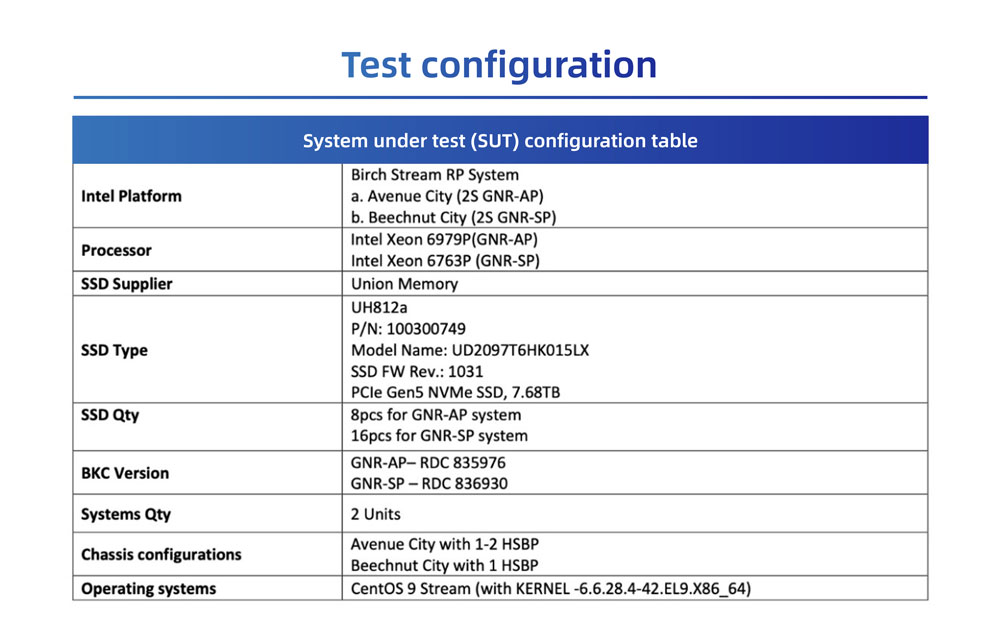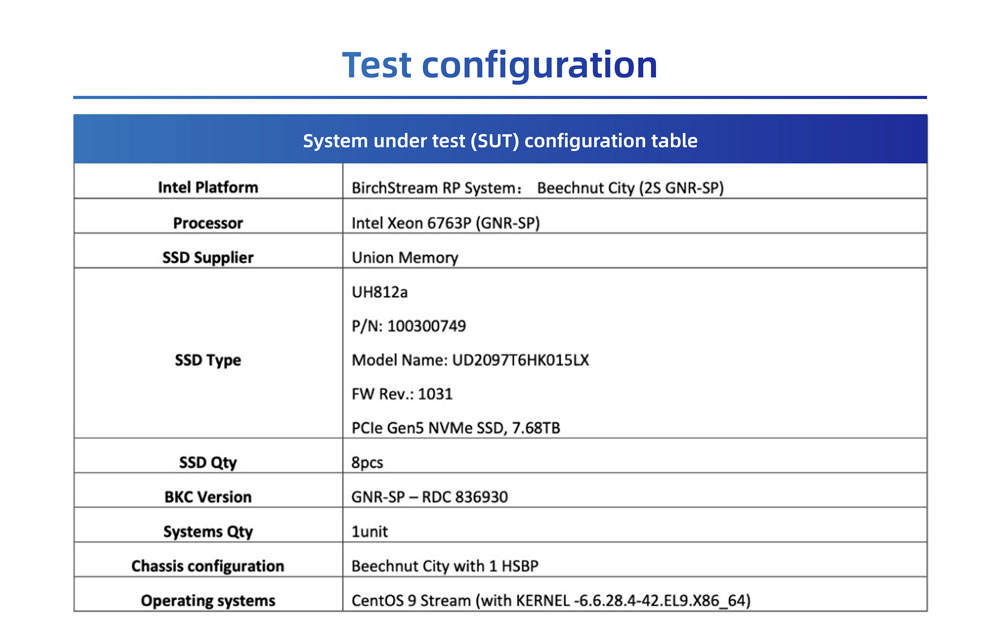
Date: May 30, 2025 Read: 1971
Share:




In November 2024, Union Memory established a technical partnership with Intel to become a partner for Intel Xeon®SSD. It also joined the Intel Data Center & AI (DCAI) China Key Component Validation Plan. Its new‑generation PCIe 5.0 ESSD UH812a achieved zero‑defect results, fully meeting Intel’s stringent BKC certification requirements and PCIe link stability tests. With its outstanding compatibility, reliability and performance, UH812a delivers stable and efficient storage support for various scenarios such as large model inference and high‑density computing.

The Key Component Validation Plan is designed to foster collaboration between Intel and its partners to drive design innovation and conduct comprehensive validation of key server components including performance, compatibility, reliability, and functionality on the Intel Xeon® platform. The plan aims to accelerate end-user adoption of partners’ latest products and jointly build an efficient, high-quality and robust X86 server ecosystem and supply chain.
Best-known-Configuration (BKC) test is conducted on Intel’s internally developed reference server platforms. Under specific hardware configurations, it conducts comprehensive and rigorous compatibility and functionality tests on specific software combination, including Intel FW components, operating systems (Windows, Linux), and drivers. The optimal software configurations that pass the tests are then released to users. If a third-party component passes the Intel platform BKC test, it indicates that the component is compatible with Intel BKC software combination on the Intel reference server platforms. Server developers can refer to this validated combination for secondary development or direct adoption in their commercial server products, helping accelerate solution integration and reduce potential compatibility risks.

Test configuration
Union Memory PCIe Gen5 UH812a SSD has undergone a range of BKC tests on the Intel Birch Stream platform, covering 10 major categories and 34 sub-items. These rigorous and complex tests cover key system function modules, including Storage, Memory, Power Management, Reset, Processor, RAS, and Power Cycling. The tests fully cover the core functions and are conducted across Windows and Linux operating systems.
The result shows that all BKC test items have been passed. System functions meet the expected requirements. The test result is marked as “Pass”, demonstrating UH812a’s excellent compatibility and reliability on the Intel Birch Stream platform. The test objective has been fully achieved.
PCIe link test ensures compatibility, performance and reliability, improving product quality, reducing maintenance cost, and accelerating the deployment of new technologies.
Before a PCIe link is operated normally, it must undergo link training, which involves the use of the Link Training and Status State Machine (LTSSM). LTSSM consists of 11 top states: Detect, Polling, Configuration, Recovery, L0, L0s, L1, L2, Hot Reset, Loopback, and Disable. These states fall into 5 categories, such as link training state, retraining state, power management state, and special state. Intel LTSSM testing targets typical state transition flows across all available PCIe slots on the server, with a particular focus on the transition processes between these states and the behavior of low-power consumption state in energy saving and recovery.

Test configuration
Union Memory PCIe Gen5 UH812a SSD has passed PCI Express-Endpoint LTSSM Testing on the Intel Birch Stream platform. The tests cover key system function modules, including SBR, Link Enable/Disable, Link Retrain, TxEqRedo, Speed Change, and PML1. These tests fully cover the core functions.
The result shows that all test items have been passed. System functions meet the expected requirements. The test result is marked as “Pass”, demonstrating UH812a SSD’s excellent PCIe protocol compliance and link reliability.
The Key Component Validation Plan, which is driven by deep technical collaboration between Intel and its partners, aims to ensure that hardware, software, and ecosystem components meet stringent technical standards. By doing so, it enhances product reliability and compatibility, providing OEM customers with the optimal solutions.
• Risk controllability: Based on the pre-validation mechanism and rigorous testing processes on the Intel Xeon® platform, the plan enables the zerorun-in period compatibility between key server components and computing platforms, reducing customer validation cost and mitigating compatibility risk.
• Product agility: Through standardized validation procedures and interoperability database, the plan shortens new product introduction cycle and accelerates OEM product time-to-market.
• Sustainable ecosystem: By establishing a closed-loop technical framework covering design specifications, testing standards, and operation & maintenance systems, the plan reduces supply chain management complexity and ensures customers’ benefit from ongoing total cost of ownership (TCO) optimization and sustained technology evolution.
Based on deep technical collaboration between Intel and Union Memory, both parties will jointly establish a high-efficiency and high-quality X86 server ecosystem supply chain. Through full-stack technical collaboration and end-to-end validation, we ensure precise alignment between hardware solutions and customer’s business scenarios, reducing deployment risks and maintenance efforts, optimizing TCO, and driving data center infrastructure toward high efficiency and sustainability.